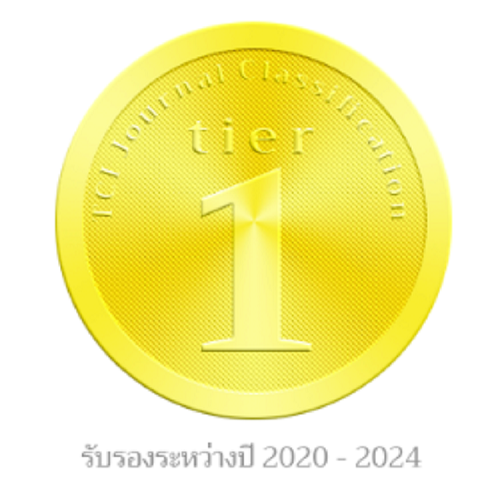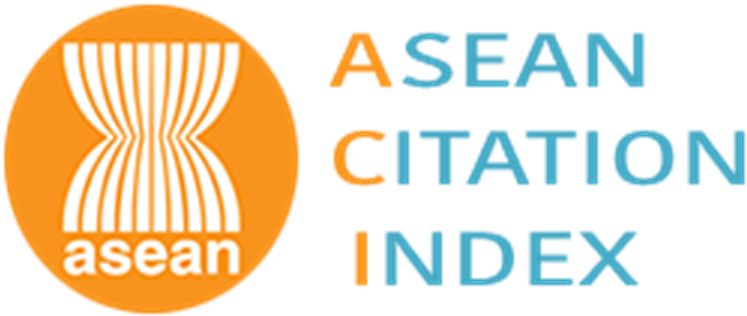Evaluation and Analysis of Factors Affecting the Development of Logistics System during COVID-19 Situation in Thailand with Regard to the Concept of Industry 4.0
Abstract
โควิด-19 เป็นโรคระบาดที่มีการแพร่กระจายตัวอย่างรวดเร็วส่งผลให้ผู้ประกอบการหลายรายต้องปิดกิจการลง ในทางตรงกันข้ามธุรกิจโลจิสติกส์และพาณิชย์อิเล็กทรอนิกส์กลับเติบโตอย่างรวดเร็ว เนื่องจากประชาชนกักตัวและทำงานอยู่ในที่พักอาศัย ด้วยพฤติกรรรมของผู้บริโภคที่เปลี่ยนไปเช่นนี้จึงมีผลต่อระบบโลจิสติกส์เป็นอย่างมาก การวิจัยนี้มีวัตถุประสงค์ เพื่อประเมินปัจจัยที่ส่งผลกระทบต่อระบบโลจิสติกส์และพัฒนาระบบงานในสถานการณ์โควิด-19 วิธีการศึกษาประกอบด้วย การศึกษาอุตสาหกรรม 4.0 การศึกษาและประเมินปัจจัยที่ส่งผลกระทบต่อระบบโลจิสติกส์ในสถานการณ์โควิด-19 การศึกษาความเป็นไปได้ในการประยุกต์ใช้อุตสาหกรรม 4.0 โดยแบบสอบถามปลายปิด การสัมภาษณ์แบบกึ่งโครงสร้าง และการสนทนากลุ่ม กับผู้บริหารระดับกลางและระดับสูง 15 ท่านของบริษัทผู้ให้บริการโลจิสติกส์ขนาดใหญ่ และพัฒนาระบบงานโดยการแนะนำเทคโนโลยีที่เหมาะสมกับระบบงานของผู้ให้บริการด้านโลจิสติกส์ ผลการศึกษาพบว่าปัจจัยที่ส่งผลกระทบต่อระบบ โลจิสติกส์ในสถานการณ์โควิด-19 ได้แก่ ความสามารถในการปรับตัวอย่างยั่งยืน ความยืดหยุ่นของห่วงโซ่อุปทาน ความไว้วางใจ การสื่อสาร และพฤติกรรมผู้บริโภค ยิ่งไปกว่านี้อุตสาหกรรม 4.0 สามารถเพิ่มประสิทธิภาพการทำงาน ลดผลกระทบของปัจจัยต่อระบบโลจิสติกส์ และช่วยในการเพิ่มขีดความสามารถในการแข่งขันด้านโลจิสติกส์ในอนาคต
COVID-19 is spreading so quickly causing many businesses to close down. On the other hand, logistics and e-commerce businesses are growing dramatically and affecting logistics system significantly because people have to stay and work at home. With the change of consumer behavior, this research aims to evaluate factors affecting logistics system and to develop work system during Covid-19 situation using Industry 4.0 principles. The paper presents literature review of Industry 4.0, the evaluation of factors affecting logistics system during Covid-19 situation and Industry 4.0 applications in logistics system using questionnaire, in-depth interview, and focus group of 15 middle and higher managers from large logistics service providers. Work system is developed based upon suggestions of appropriate technologies for logistics system. The result shows that the factors affecting logistics system during Covid-19 situation include sustainable adaptability, supply chain flexibility, trust, communication, and consumer behavior. More importantly, Industry 4.0 principles can improve productivity, reduce the effects of factors affecting logistics system and increase logistic competitiveness in the future.
Keywords
[1] World Health Organization. (2020, Dec). Coronavirus disease (COVID-19) advice for the public. Geneva, Switzerland. [Online]. Available: https://www.who.int/emergencies/diseases/ novel-coronavirus-2019/advice-for-public
[2] Department of Disease Control. (2020, Dec). Corona Virus Disease (COVID-19). Nonthaburi, Thailand. [Online]. Available: https://ddc. moph.go.th/viralpneumonia/eng/index.php
[3] T. K. Dasaklis, C. P. Pappis, and N. P. Rachaniotis, “Epidemics control and logistics operations: A review,” International Journal of Production Economics, vol. 139, no. 2, pp. 393–410, 2012.
[4] L. Zhang, J. Tian, R. Y. Fung, and C. Dang, “Materials procurement and reserves policies for humanitarian logistics with recycling and replenishment mechanisms,” Computers & Industrial Engineering, vol. 127, pp. 709–721, 2019.
[5] K. H. Goldschmidt and S. Kumar, “Humanitarian operations and crisis/disaster management: A retrospective review of the literature and framework for development,” International Journal of Disaster Risk Reduction, vol. 20, pp. 1–13, 2016.
[6] S. A. Torabi, I. Shokr, S. Tofighi, and J. Heydari, “Integrated relief pre-positioning and procurement planning in humanitarian supply chains,” Transportation Research Part E: Logistics and Transportation Review, vol. 13, pp. 123–146, 2018.
[7] A. Kumar, S. Luthra, K. Mangla, and Y. Kazançoğlu, “COVID-19 impact on sustainable production and operations management,” Sustainable Operations and Computers, vol. 1, pp. 1–7, 2020.
[8] V. Alcácer and V. Cruz-Machado, “Scanning the industry 4.0: A literature review on technologies for manufacturing systems,” Engineering Science and Technology, an International Journal, vol. 22 no. 3, pp. 899–919, 2019.
[9] P. Wisidwinyoo, S. Thapjit, and S. Wisuttipaet, “The factors affecting innovation management in food industrial case study: Cpram company limited,” The Journal of KMUTNB, vol. 30, no. 2, pp. 343–350, 2019 (in Thai).
[10] C. Maksuk, S. Thepchit, and S. Srikijsuwan, “Business development model for metal parts manufacturing for the aerospace industry,” The Journal of KMUTNB, vol. 30, no. 1, pp. 170–181, 2019 (in Thai).
[11] P. Somparn, “Measure of dispersion in biological research: Standard,” Thai Science and Technology Journal, vol. 26, no. 3, pp. 490–498, 2018 (in Thai).
[12] N. Neawchumpa, C. Ponathong, and J. Skulkhu, “A factor analysis of scientific attitude of science students of public,” Veridian E-Journal, Silpakorn University, vol. 9, no. 3, pp. 1676–1691, 2016 (in Thai).
[13] B. Texsanguan, T. Boonyasopon, W. Ketsingha, and N. Surapongrakjaron, “The development model of learning organization and knowledge management by knowledge sharing via internet network,” The Journal of KMUTNB, vol. 24, no. 1, pp. 198–211, 2014 (in Thai).
[14] G. Büchi, M. Cugno, and R. Castagnoli, “Smart factory performance and Industry 4.0,” Technological Forecasting and Social Change, vol. 150, pp. 119790–119800, 2020.
[15] E. Hofmann and M. Rusch, “Industry 4.0 and the current status as well as future prospects on logistics,” Computers in industry, no. 89, pp. 23-34, Aug. 2017.
[16] M. Jongprasithporn, N. Yodpijit, C. Phaisanthanaphark, Y. Buranasing, and T. Sittiwanchai, “Effects of industry 4.0 on human factors/ergonomics design in 21st century,” in Advances in Intelligent Systems and Computing, 2020, vol. 1202 AISC, pp. 437–443.
[17] M. S. Kuma, R. D. Raut, V. S. Narwane, and B. E. Narkhede, “Applications of industry 4.0 to overcome the COVID-19 operational challenges,” Diabetes & Metabolic Syndrome: Clinical Research & Reviews, vol. 14, no.5, pp. 1283–1289, 2020.
[18] K. Fukuda, “Science, technology and innovation ecosystem transformation toward society 5.0,” International Journal of Production Economics, vol. 220, pp. 107460–107474, 2019.
[19] T. P. Vu, D. B. Grant, and D. A. Menachof, “Exploring logistics service quality in Hai Phong, Vietnam,” The Asian Journal of Shipping and Logistics, vol. 2, no. 36, pp. 54–64, 2020.
[20] B. A. Kadir and O. Broberg, “Human well-being and system performance in the transition to industry 4.0,” International Journal of Industrial Ergonomics, vol. 76, pp. 102936–102949, 2020.
DOI: 10.14416/j.kmutnb.2022.09.011
ISSN: 2985-2145





